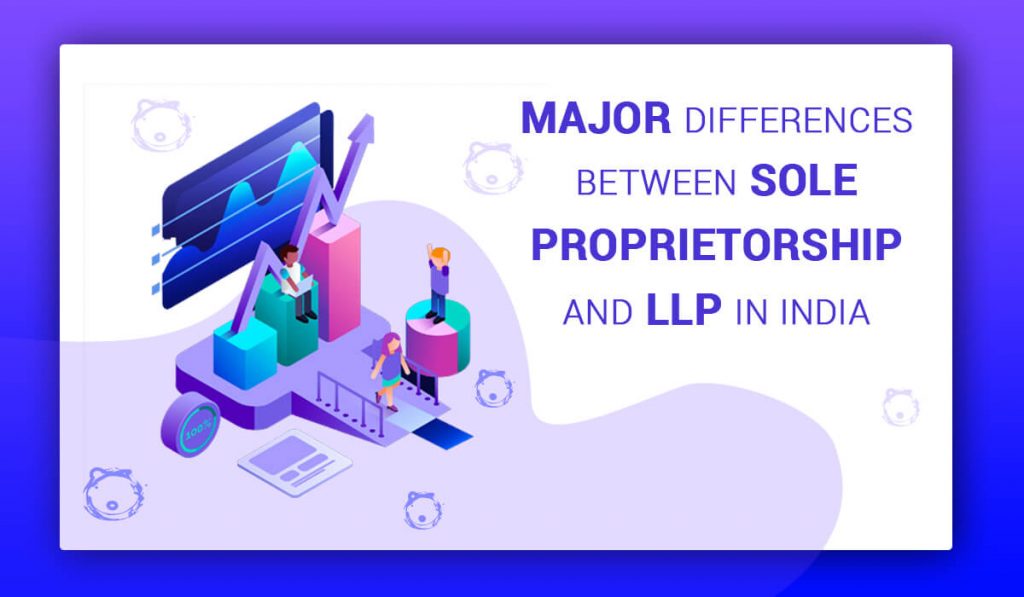Major Differences Between Sole Proprietorship Vs LLP in India

Gonica Verma | Updated: Jul 03, 2019 | Category: Limited Liability Partnership, Sole Proprietorship
In India, all the petty retailers, traders, small scale entrepreneurs, etc. register themselves as Sole Proprietor of their firm as they solely want to own their firm without distributing profits among their partners. A sole proprietorship is also called “One Person Company” where there is a single owner who manages all the assets, debts, financial legal issues of the company. On other side, Limited Liability Partnership is formed by at least two partners who invest in the business according to their will and share profit and loss of the company. The liability in case of LLP is protected while in Sole Proprietorship it is not protected and the personal assets of the owner could be seized in case of solvency. To know more about Sole Proprietorship Vs LLP in India, let’s proceed further-
Table of Contents
Difference in the meaning of Sole Proprietorship & LLP
Sole Proprietorship
A sole proprietorship is a form of business entity that is formed by one person who is responsible for all its operations. This is also known as “One Person Company”. It has no separate legal entity as in other business forms. The sole proprietor can do business operations under the name of the owner or under any fictitious name such as “Suresh mobile repair shop”. In such a business form, the owner or the proprietor of the business is responsible for all the financial legal issues, debts, assets, liabilities, etc. It does not separate business from its owner as in the case of PVT LTD, LLP, etc. This form of entity is suitable for petty businessmen who have very less capital requirements and do not want to indulge in the back-breaking legal registration process.
Limited Liability Partnership
Limited Liability Partnership (LLP) has been formed under the Limited Liability Partnership Act, 2008. This type of entity is formed by two or more partners who are protected by limited liability without the interference of their personal assets. LLP has a separate legal entity and has separate debts and assets for their company. This form of entity is the combination of Partnership and Corporation in which owners of the business are protected from any legal trouble. In the case of solvency, it doesn’t affect the personal assets of the owners. It has a very simple Incorporation process with less legal compliances which is suitable for micro and medium-scale entrepreneurs.
The difference in the documents required for Sole Proprietorship & LLP in India
Sole proprietorship
There are few documents required for forming up the sole proprietorship as follows:
- KYC documents of bank
- Identity proof of the owner (Aadhar Card, Voter ID card)
- PAN card of the owner
- Office address proof
- Utility Bill
- Income tax returns of the owner
- Proof of office address (Rent Agreement, Possession letter, copy of property papers)
- NOC by landlord in case of rented land
- Shop and Establishment License
- Service Tax Certificate[1] (in case of service business)
- Charted Account Certification (in special cases)
- CST/ VAT certificate
Limited Liability Partnership
The following documents are required for LLP registration:
- PAN card of the directors
- Passport size photo of directors
- Identity proof of directors (Aadhar card, Voter ID card)
- Address proof of the office (Rented agreement, Possession letter, copy of property papers)
- Utility Bill
- Latest bank statements
- NOC by landlord in case of rented land
- Copy of the passport in case of foreign national
- Incorporation Certificate (if applicable)
Difference in the formation process of Sole Proprietorship & LLP in India
Sole Proprietorship
- The first step for the formation of a Sole Proprietor firm is to apply for the PAN card.
- After that, you can decide any unique name for your company by which your firm will be known to the public.
- Then decide the location where you want to begin your business operations.
- In the next step, you need to open the current bank account with the company’s name.
- Then, you can obtain the Shop and Establishment License if you are a small retailer, trader, etc.
- You need to obtain GST registration if your turnover exceeds 40 lakh and 20 lakh in North-eastern Regions like Assam, Mizoram, etc.
Limited Liability Partnership
- In LLP, the first step is to obtain a Digital Signature Certificate (DSC) from its Certifying Authorities. According to the Information technology Act, 2008, directors should obtain DSC to submit electronic forms for the security and authenticity of documents.
- After obtaining DSC, they can apply for DIN (Director Identification Number) or DPIN (Designated Partner Identification Number). Both DPIN & DIN can be obtained by filing up E-Form DIR-3.
- After obtaining 8 digits DIN, directors can approve their proposed company’s name through Reserve Unique Name (RUN) by filing up 2 suggestions and check the existing companies name as well.
- Then after the proposed LLP’s name approval, the applicants need to file the Incorporation application in e-form FiLLip (Form for Incorporation of Limited Liability Partnership) with the Registrar.
- When the Incorporation of the company will be done, then, the directors/partners need to fill the Limited Liability Partnership Agreement within 30 days of the date of Incorporation. LLP Agreement can be filed on Form 3 which is available on Ministry of Corporate Affairs (MCA) portal and the agreement should be printed on stamp paper which maintains the flexibility in business management.
Difference in the advantages of Sole Proprietorship & LLP in India
Sole proprietorship
- A sole proprietorship can be easily formed by a single person.
- Owners can establish sole proprietorship easily with less capital requirements.
- A sole proprietor needs not to pay any corporate tax as in the case of other entities.
- Owners can freely combine business and personal assets.
- The owner of the business is solely responsible for the activities of his business and can run a business according to his/her choice.
Limited Liability Partnership
- LLP provides limited liability protection to the owners of the company from all the debts and credits.
- LLP has a simple Incorporation process with the least legal compliances.
- There is no maximum limit on the number of partners to form an LLP.
- The partners of LLP are exempted to pay DDT (Dividend Distribution Tax)
- Preferable by CAs, CPAs, Advocates, etc.
- In LLP, there is transparency and flexibility in business management as everything has been mentioned in the written document even the profit distribution ratio of the partners.
- There is no requirement of compulsory audit in case of LLP.
- There is no minimum capital requirement to form LLP. All the capital contribution will depend on the will of partners.
Difference in the disadvantages of Sole Proprietorship & LLP
Sole Proprietorship
- Personal assets of the owner are not protected in case of Sole proprietorship. The personal assets of the owner could be seized in case of business solvency.
- Sole proprietorship firms can rarely survive in case of the owner’s death or bankruptcy.
- Sole proprietor cannot raise more capital for his business as only single person is managing all the business.
Limited Liability Partnership
- Limited Liability Partnership must have at least 2 members; LLP may get dissolved if any one member chooses to leave the company.
- LLP has to file Income Tax and MCA’s annual returns every year even in case it doesn’t have any activity. They have to penalty Rs100/day if they are not able to file returns on time.
- LLP cannot raise funds from shareholders, as the concept of issuing equity shares cannot exist in LLP. Hence, even the angel investors, Venture Capital etc can prefer Private limited over LLP for their investments.
- The income tax rate for LLP is 30% irrespective of its turnover. Generally, it is 25% for the companies except for LLP who has a turnover of up to 250 crores.
Conclusion
From the above information it is concluded that small and petty entrepreneurs who solely want to operate the business operations without any interference and have very less capital to invest in the business must register the company as sole proprietorship because, in this, they can freely combine their business and personal assets without paying any corporate tax but if he/she wants to add new partner in the company with their limited liability protection then should register their company as LLP in India because in this, their liability is protected and there would be no harm to the personal assets of the directors/partners.
LLP in India is mostly preferable by Advocates, CAs, CPAs; micro and medium scale entrepreneurs while Sole Proprietorship could only be preferred by small scale entrepreneurs as it is the simplest business form. For the registration of LLP and Sole Proprietorship, please contact Swarit advisors.
Also, Read our Article: Advantages of Private Limited Company Over Limited Liability Partnership














